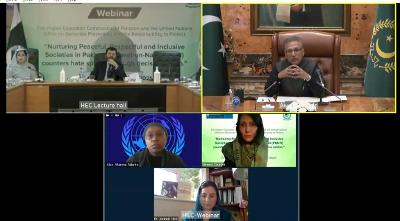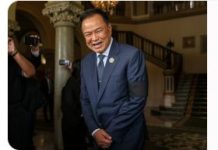Islamabad, March 18, 2021: The expressions of extremists anywhere in the world must not be taken as a specimen or impression to define or understand a particular nation.
This was stated by President of Pakistan Dr. Arif Alvi while addressing the opening ceremony of a series of webinars entitled, “Nurturing Peaceful, Respectful and Inclusive Societies in Pakistan: Seerat counters hate speech through decisive action”, being jointly organised by the United Nations Office on Genocide Prevention and the Responsibility to Protect (OSAPG) and the Higher Education Commission (HEC), Pakistan.
The introductory webinars will continue for three days to cover six sessions on topics like Seerat of the last Prophet Hadhrat Muhammad, peace be upon him (PBUH), minorities, and the role of youth in combating hate speech.
The series of webinars aim at encouraging peaceful, inclusive, and empathetic communities in Pakistan through tools like active and continuous intersectional participations, dialogue, and collaboration. It is linked to the implementation of the Plan of Action for religious leaders and actors to prevent incitement to violence that could lead to atrocity crimes and the UN Strategy and Plan of Action on Hate Speech. It also aims to contribute to achieving the Sustainable Development Goals (SDGs), in particular SDG16 on building peaceful, inclusive and just societies.
Dr. Alvi said it is incumbent on all of us to present the true principles of Islam that counter all kinds of religious, ethnic and gender hatred, marginalisation, discrimination, and inequality. He underlined that Islam establishes the fact that all the human beings are equal, and there is no point of discrimination among them except piety. He said that Arabs had a patriarchal society wherein slavery was common, yet the Last Prophet Hadhrat Muhammad (PBUH) encouraged people to break the chains of slavery.
He maintained that the Last Prophet Muhammad (PBUH) taught and emphasised on forgiveness, putting compensation a secondary and vengeance a last resort in case of any confrontation. He said that the Last Prophet Hadhrat Muhammad (PBUH) laid emphasis on adopting a just approach in financial affairs to set up an economically just society. He mentioned that the father of the Pakistani nation, Muhammad Ali Jinnah, was also a staunch advocate of unity and peaceful coexistence.
The President said that making Pakistan a model of the State of Madinah is the final goal, as envisioned by the Prime Minister of Pakistan Imran Khan. He underlined that lack of communication generates phobias among individuals, states, and nations, yet cooperative and peaceful discussions, as enshrined in the UN Charter, are the key to address these phobias. He stated that hate speech should have no standing in Pakistan. “We need to make sure that the laws isolating communities must be condemned.” Highlighting the role of media, he stressed the need for judiciously handling the ‘weapons of misinformation’ and communicating to the world that Pakistan is a peaceful country, and the Muslims around the world are peaceful.
In his remarks, Chairman HEC Tariq Banuri stressed the need for promoting education to give an end to hate speech, intolerance, and bigotry rising around the world. He said that the waves of extremism can be addressed by adopting the true teachings of the Holy Prophet. Mentioning the Prime Minister’s vision about making Pakistan the State of Madinah, he quoted him as saying that: “If people know the true history of Islam, they would not only recognise it, but will also embrace it.”
The Chairman underlined that the teachings of Holy Prophet brought about a massive transformation in the society that led to subsequent measures like establishment of Baitul Hikmah, also known as the Grand Library of Baghdad. He shared with the participants that HEC introduced new programmes in the undergraduate education policy to bring together the true history and civilization of the Islamic society. The new policy is inclined towards promoting greater interaction and engagement between a teacher and a student on the pattern of Sufi episteme. He explained that this concept was based on the practice of the past, when students from all over the world would flock to the learned people, like Sufis.
Executive Director HEC Dr. Shaista Sohail highlighted the significance of the webinars on the teachings in the Seerat of the Last Prophet (PBUH) regarding hate speech, unsophisticated behaviors, words and gestures, and inconsiderate, selfish and unkind attitudes. She said that Islam gives due respect to the life and property of every human being, men and women alike, and it preached that the conflicts can be addressed by forging forgiveness and forbearance. The Victory of Makkah was a perfect precedent of forgiveness and tolerance, she affirmed.
The Executive Director said that the Seerat disapproved of the behaviors inciting people to hatred for others. There is a strong need for adopting the manners and etiquettes, taught by the Last Prophet (PBUH), nationally and globally to ensure peace and interfaith harmony. She also mentioned different remarkable developments from the life of the Last Prophet (PBUH), like the Hilful Fudul (the Alliance of Excellence), the Mawakhat-e-Madinah (the brotherhood among the Muslims of Madinah), and the Treaty of Hudaybiyya as an example of the steps taken for peaceful coexistence. She said that Quaid-e-Azam Muhammad Ali Jinnah also had the vision to promote peaceful coexistence and communal harmony, assuring the minorities of their rights.
On this occasion, Ms. Alice Wairimu Nderitu, UN Special Adviser, UN, emphasised that the United Nations was committed to using education as a tool to counter hate speech. “Education highlights difference between good and bad, right and wrong, and true and false.” She said that promotion of quality education and establishment of peace, justice and strong institutions were among the UNDP’s Sustainable Development Goals (SDGs). None of the SDGs to establish inclusive and resilient societies by 2030 can be achieved without promotion of education, she affirmed. She also acknowledged the world’s accumulative response to COVID-19. She said that the past decade witnessed an increase in access to education, however there was still a lot to be done in this direction.
She appreciated the Government of Pakistan for its commitment to achieve the goal of ensuring free and compulsory education for all, as per the Constitution of Pakistan. She observed that the governments around the world had a strong role in combating the increased exclusion and stigmatisation of communities and groups, especially on the social media platforms. She emphasised that the majority and the minority need to join hands to wipe out hate speech and fulfil the responsibility to protect the marginalised segments of societies. She also highlighted the role of Pakistani youth in elimination of discrimination by capitalising education.
Dr. Asad Zaman, former Vice Chancellor Pakistan Institute of Development Economics, Dr. Ayesha Rafique, faculty member of Fatima Jinnah Women University, and Dr. Aayesha Leghari, author of Creativity, also spoke on the occasion, while Dr. Amineh Hoti, former Project Director for Seerat Chairs, HEC, and Dr. Simona Cruciani, Political Affairs Officer at the UN Office on Genocide Prevention and the Responsibility to Protect moderated the first day webinars.
The UN and the HEC aim to follow these webinars in a few months with another set of sessions giving more time to speakers in order to allow supportive in-depth impact.

















